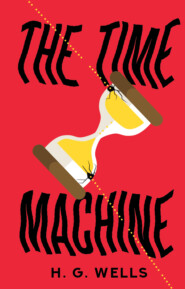По всем вопросам обращайтесь на: info@litportal.ru
(©) 2003-2025.
✖
The World Set Free
Настройки чтения
Размер шрифта
Высота строк
Поля
He wandered down into the thronging gayer parts of London, in which a year or so ago he had been numbered among the spenders.
London, under the Visible Smoke Law, by which any production of visible smoke with or without excuse was punishable by a fine, had already ceased to be the sombre smoke-darkened city of the Victorian time; it had been, and indeed was, constantly being rebuilt, and its main streets were already beginning to take on those characteristics that distinguished them throughout the latter half of the twentieth century. The insanitary horse and the plebeian bicycle had been banished from the roadway, which was now of a resilient, glass-like surface, spotlessly clean; and the foot passenger was restricted to a narrow vestige of the ancient footpath on either side of the track and forbidden at the risk of a fine, if he survived, to cross the roadway. People descended from their automobiles upon this pavement and went through the lower shops to the lifts and stairs to the new ways for pedestrians, the Rows, that ran along the front of the houses at the level of the first story, and, being joined by frequent bridges, gave the newer parts of London a curiously Venetian appearance. In some streets there were upper and even third-story Rows. For most of the day and all night the shop windows were lit by electric light, and many establishments had made, as it were, canals of public footpaths through their premises in order to increase their window space.
Barnet made his way along this night-scene rather apprehensively since the police had power to challenge and demand the Labour Card of any indigent-looking person, and if the record failed to show he was in employment, dismiss him to the traffic pavement below.
But there was still enough of his former gentility about Barnet’s appearance and bearing to protect him from this; the police, too, had other things to think of that night, and he was permitted to reach the galleries about Leicester Square – that great focus of London life and pleasure.
He gives a vivid description of the scene that evening. In the centre was a garden raised on arches lit by festoons of lights and connected with the Rows by eight graceful bridges, beneath which hummed the interlacing streams of motor traffic, pulsating as the current alternated between east and west and north and south. Above rose great frontages of intricate rather than beautiful reinforced porcelain, studded with lights, barred by bold illuminated advertisements, and glowing with reflections. There were the two historical music halls of this place, the Shakespeare Memorial Theatre, in which the municipal players revolved perpetually through the cycle of Shakespeare’s plays, and four other great houses of refreshment and entertainment whose pinnacles streamed up into the blue obscurity of the night. The south side of the square was in dark contrast to the others; it was still being rebuilt, and a lattice of steel bars surmounted by the frozen gestures of monstrous cranes rose over the excavated sites of vanished Victorian buildings.
This framework attracted Barnet’s attention for a time to the exclusion of other interests. It was absolutely still, it had a dead rigidity, a stricken inaction, no one was at work upon it and all its machinery was quiet; but the constructor’s globes of vacuum light filled its every interstice with a quivering green moonshine and showed alert but motionless – soldier sentinels!

















